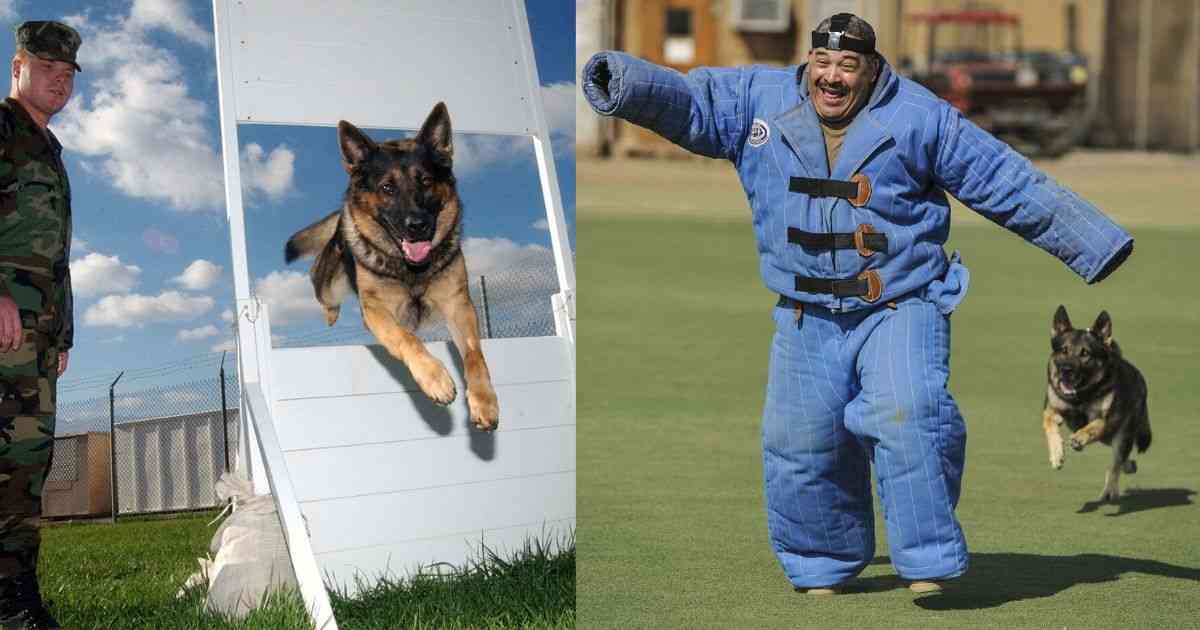Updated July 29, 2021
One of the common arguments for not desexing a dog is the effect on their trainability, especially herding, guarding or protection. But does this really happen?
This question is not just relevant to the police, military or farming sectors. It matters to all of us who want a well-behaved dog.
The main debate is of course with male dogs. To this day, you will see that most protective and guard dogs around the world are not castrated. Now for the first time, a research paper has specifically looked at this question.
Working Dogs & Neutering: The Evidence
Young adult male military dogs in Switzerland were either left ‘intact’ or given a hormonal implant called Suprelorin that blocks testosterone production. This gives the same result as castration, except chemically not surgically.
Then they were given these tests:
| Obedience | Walk on a leash, walk off leash, positions (sit / lay down), reaction to gunshot, walk through a group of people, recall with distraction, down- stay for 5min |
| Protection | Attack towards a human, chase an attacker, recall from the attacker |
| Social | Walk in town; reaction to people, dogs, cars and bicycles; train ride |
| Building | Search, barking, entering building, successful finding |
The results? Castration had no measurable effect on any of the results.
This may surprise you, but it’s exactly what I would have expected. A 2005 study of trainability in 11 common breeds found the same thing for 9, and an improvement after desexing in the other two. These were Rottweilers and Shetland Sheepdogs.
It also fits well with our theories of dog learning. Studies in wolves have repeatedly shown how badly they train compared with domestic dogs. Trainability is a genetic trait that humans have selected, not something ‘natural’. Why should it be affected by sex or neuter status?
How well a dog works is far more likely to be governed by the quality of the training and reward techniques being used. These dogs may be showing aggression while working, but this aggression isn’t hormonal, it’s learnt.
Not only does this news give us a whole lot of new respect for dogs (what, more?), it also gives us the freedom to neuter based on a dog’s needs. These same results are likely to be equally as applicable to farm dogs or even your dog training classes.
And just to show there’s nothng new under the sun, here’s a quote from 370BC.
When dogs are neutered they stop running away from their owners, but they are no worse at shepherding and hunting.
Xenophon, Cyropaedia 7.5.62
Related: Desexing & Human-Directed Aggression | Why Desex Male Dogs?
Have something to add? Comments (if open) will appear within 24 hours.
By Andrew Spanner BVSc(Hons) MVetStud, a vet in Adelaide, Australia. Meet his team here.
References
Gfrerer, N., Taborsky, M., & Würbel, H. (2019). No evidence for detrimental effect of chemical castration on working ability in Swiss military dogs. Applied animal behaviour science, 211, 84-87
Serpell, J. A., & Hsu, Y. A. (2005). Effects of breed, sex, and neuter status on trainability in dogs. Anthrozoös, 18(3), 196-207


Hi: We are over in the US where neutering is “prevalent”. We have a Czech German Shepherd imported for dog sports (Schutzhund/IGP) and to be a companion. He came to us at 7 months old and was just a VERY high energy puppy. At 20 months, he started becoming a bit dominant with my wife, and we didn’t know what to do. He is exceptionally well trained (on-leash, off leash, in the home). The “dominance” takes the form of growling when being petted by my wife. Never with me (his principal handler), but with my wife. She became a bit frightened and arranged for him to be neutered on December 22nd. We still don’t know if it is the right thing to do! Unfortunately veterinarians here are very pro-neuter! He will be 23 months on December 22nd. He is a very confident dog and relates to other dogs respectfully – because I enforce that. I have for sure noticed an increasing pre-occupation with marking and sniffing and licking (urine) on walks. Again, though – I only allow that within a structured walking scenario, during which some of the time is spent “heeling” with me and he is not allowed to sniff. I just hope we are not doing the wrong thing. He is a tremendous working dog candidate – the best I have seen in a decade.
Hi Zahed. Cases like this are difficult to comment on, because although I can say that the behaviour you describe is more common in entire male dogs than neutered ones, in any individual case it’s impossible to be so certain. I would in fact neuter, and you will hopefully be surprised by how little things change. Unfortunately, that will probably also be true for the behaviour of concern, but it’s worth trying given the potential consequences of it worsening. I would strongly suggest you simultaneously engage your wife in the training program if it all possible so that your dog also begins to see her as a leader together with the hormonal change.